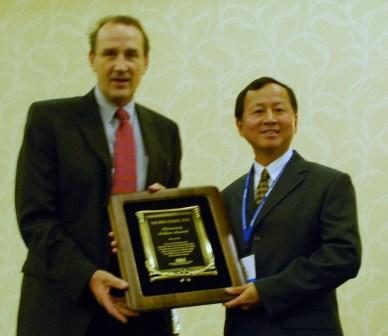 Dr. Tse Wen Chang, Distinguished Research Fellow of Genomics Research Center from Academia Sinica was recognized by the “American Academy of Allergy, Asthma & Immunology”, a.k.a. AAAAI on February 25 in its 2007 annual meeting by granting an AAAAI 2007 Honorary Fellow Award. AAAAI grants one such award to one recipient yearly since 1947, and Dr. Chang is the first Chinese who has won such honor.
Dr. Tse Wen Chang, Distinguished Research Fellow of Genomics Research Center from Academia Sinica was recognized by the “American Academy of Allergy, Asthma & Immunology”, a.k.a. AAAAI on February 25 in its 2007 annual meeting by granting an AAAAI 2007 Honorary Fellow Award. AAAAI grants one such award to one recipient yearly since 1947, and Dr. Chang is the first Chinese who has won such honor.
Of the few Chinese scientists who succeed in academic and entrepreneurial aspects in regards to new drug development, Dr. Chang has a good insight in making genetically engineered antibodies. 20 years ago, partly because he himself suffered from severe hey-fever, he investigated the immune mechanisms of allergic responses. His invention later turned into many valuable patents and a drug Xolair, which has been approved for asthma treatment in the United States, European Union, and many other countries.
Although this new drug has generated US$ 460 million sales in 2006 in the US alone, Dr. Chang thinks that his recognition by AAAAI is partly because the drug has been used to relieve the suffering of many patients with severe asthma and partly because the drug has clarified role of IgE in the pathogenesis of asthma and other allergic diseases. In fact, the anti-IgE drug has been investigated in more than 30 phase II and phase III clinical trials on various allergic indications, including asthma, allergic rhinitis, anaphylactic reactions to peanuts, atopic dermatitis, and others, which affect large populations of patients. Chang said that allergic diseases are more prevalent in economically advanced countries. For example, in the United States and western European countries, many children are allergic to peanuts, and in Taiwan, living in closed spaces has led to the exposure of high concentrations of airborne dust mites and increased asthmatic cases, especially among young children. Allergic diseases cause strains in families and huge healthcare costs. Xolair is currently prescribed for treating moderate-to-severe cases of asthma that cannot be controlled by bronchial dilators and corticosteroids. More than 80,000 patients have benefited from Xolair.
The creation of Xolair was started from anti-IgE antibodies prepared from lab mice. Chang successfully modified it into human antibodies with genetic engineering methodologies. The anti-IgE drug is produced by animal cells cultured in large bioreactor tanks. According to Chang, since he joined the Genomics Research Center in 2006, he has been stepping up efforts on developing novel antibody-based therapeutics. The second generations of anti-IgE drugs are part of his research endeavors.
Dr. Tse Wen Chang has written up an updated review summarizing the development of anti-IgE approach. The article titled “Anti-IgE Antibodies for the Treatment of IgE-Mediated Allergic Diseases “will be published in the April issue of “Advances In Immunology” vol. 93.
Regarding AAAAI
The “American Academy of Allergy, Asthma & Immunology”, a.k.a. AAAAI, has over 6500 members, among them more than 1000 fellows, of mostly practicing doctors and academic clinical researchers. It is the largest international professional society in the field of allergy, asthma, and immunology. AAAAI grants one Honorary Fellow Award each year in its annual meetings.


